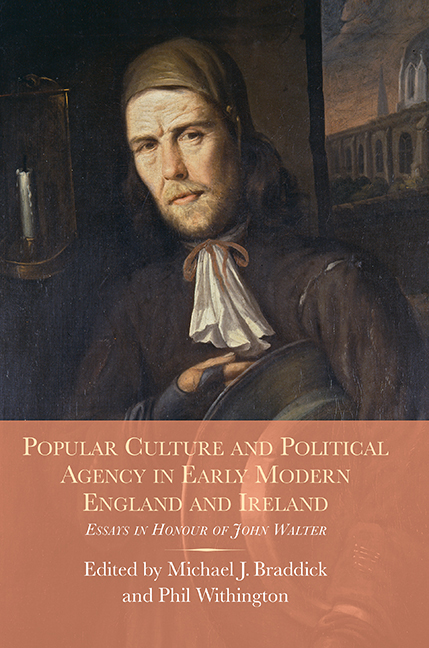 Popular Culture and Political Agency in Early Modern England and Ireland
Popular Culture and Political Agency in Early Modern England and Ireland Book contents
- Frontmatter
- Contents
- List of Illustrations
- List of Contributors
- Acknowledgements
- List of Abbreviations
- Introduction
- 1 John Walter and the social history of early modern England
- 2 Contrasting susceptibility to famine in early fourteenth- and late sixteenth-century England: the significance of late medieval rural social structural and village governmental changes
- 3 The politics of English political economy in the 1620s
- 4 Provision, household management and the moral authority of wives and mothers in early modern England
- 5 Popular senses of past time: dating events in the North Country, 1615–1631
- 6 Spectral lordship, popular memory and the boggart of Towneley Hall
- 7 Self-image and public image in the career of a Jacobean magistrate: Sir John Newdigate in the Court of Star Chamber
- 8 Gender, agency and religious change in early Stuart England
- 9 ‘A Standard which can never fail us’: the Golden Rule and the construction of a public transcript in early modern England
- 10 Religion, anti-popery and corruption
- 11 An ‘Aristotelian moment’: democracy in early modern England
- 12 John Lilburne and political agency in revolutionary England
- 13 An Irish Protestation? Oaths and the Confederation of Kilkenny
- 14 ‘Whereat his wife tooke great greef & died’: dying of sorrow and killing in anger in seventeenth-century Ireland
- Bibliography for John Walter
- Index
- Tabula Gratulatoria
- Miscellaneous Endmatter
9 - ‘A Standard which can never fail us’: the Golden Rule and the construction of a public transcript in early modern England
Published online by Cambridge University Press: 09 May 2017
- Frontmatter
- Contents
- List of Illustrations
- List of Contributors
- Acknowledgements
- List of Abbreviations
- Introduction
- 1 John Walter and the social history of early modern England
- 2 Contrasting susceptibility to famine in early fourteenth- and late sixteenth-century England: the significance of late medieval rural social structural and village governmental changes
- 3 The politics of English political economy in the 1620s
- 4 Provision, household management and the moral authority of wives and mothers in early modern England
- 5 Popular senses of past time: dating events in the North Country, 1615–1631
- 6 Spectral lordship, popular memory and the boggart of Towneley Hall
- 7 Self-image and public image in the career of a Jacobean magistrate: Sir John Newdigate in the Court of Star Chamber
- 8 Gender, agency and religious change in early Stuart England
- 9 ‘A Standard which can never fail us’: the Golden Rule and the construction of a public transcript in early modern England
- 10 Religion, anti-popery and corruption
- 11 An ‘Aristotelian moment’: democracy in early modern England
- 12 John Lilburne and political agency in revolutionary England
- 13 An Irish Protestation? Oaths and the Confederation of Kilkenny
- 14 ‘Whereat his wife tooke great greef & died’: dying of sorrow and killing in anger in seventeenth-century Ireland
- Bibliography for John Walter
- Index
- Tabula Gratulatoria
- Miscellaneous Endmatter
Summary
Characterised by depth and resourcefulness, a willingness to engage with competing contemporary discursive strategies and an insistence of the specificities of time, place and circumstance, John Walter's archival research has offered a fresh approach to ‘popular’ politics in early modern England. His findings document the crowd's desire to demonstrate order and rationality, their political savviness and their quest for negotiated outcomes. Designed to secure an appropriate response from the authorities, their actions were informed by considerable knowledge of the law and threatened violence only after the exhaustion of other means. Accordingly, their protests commonly mimicked administrative practice, and they took upon themselves the implementation of existing codes of mutual obligation when their governors failed to do so. Underpinning their capacity to act was a sense of mutual obligation as the basis of social cohesion. That sense has been described by the anthropologist James C. Scott, in language adopted by Walter, as the ‘public transcript’.
Where coercive and bureaucratic resources are scarce, Scott argues, rulers must seek some degree of cooperation, participation and collaboration from those over whom they bear rule. To achieve this, their ‘rule ’ may be legitimated and popular collaboration sought through a shared public transcript offering some guarantees of security, protection and even well-being to the ruled. The powerful may also be constrained by reputational needs and their desire to uphold the theatre of power. In turn, this bestows some leverage – the weapons of the weak – upon the subordinate in their negotiation and renegotiation of the realities of power. Their collaboration is essential to governance but it comes at a price. Both Scott and Walter have emphasised ‘the politics of the everyday’ as the crucible in which the nature and terms of the public transcript have to be worked out and renewed. It is in the quotidian processes of renegotiation and adjustment that the codes of mutual obligation are tested and reinforced. Though they can retain their significance in great social crises, they may also be overwhelmed by violence in such exceptional upheavals.
What has not been so systematically explored is the construction and dissemination of the public transcript. Out of what material is it made and how is it brought to pervade popular discourse? For it to fulfil its function, the public transcript has to be widely endorsed, condition everyday behaviour and be accessible – and acceptable – to all sections of the community.
- Type
- Chapter
- Information
- Popular Culture and Political Agency in Early Modern England and IrelandEssays in Honour of John Walter, pp. 165 - 180Publisher: Boydell & BrewerPrint publication year: 2017
